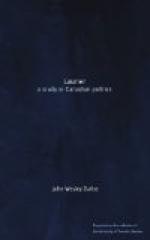The danger of a profound division of the Canadian people in war-time passed; but irretrievable damage had been done to the cause of national unity. In considering subsequent events these unhappy developments of the first year of the war cannot be overlooked. Party feeling among the Liberals had been held in leash with difficulty; now it was running free again. The attitude of the party towards the government was in effect: “You have tried to play politics with the war; very well, you will find that this is a game that two can play at.” The strategy looking to a future trial of strength was skilfully planned. There was no challenge to the government plans. It was given full liberty of action upon the understanding that it would accept full responsibility and be prepared to render an account in due time to parliament and people. The tactics were those of paying out the rope as the government called for it. The attitude of the Liberal leaders towards the war was unexceptionable. Sir Wilfrid’s recruiting speeches—and he made many of them—were admirable; and he did not hesitate to point the way of duty to the young men of his own province. Upon things done or not done the attitude of the parliamentary Liberals was increasingly critical; and the government, it must be said, with its scandals over supplies, its favoritism in recruiting, its beloved Ross rifle, gave plenty of opportunity to opposition critics. With every month that passed the political advantage that had come to the government, because it was charged with the task of making war, waned.
General elections were due in the autumn of 1916. It became a serious question of Liberal policy to decide between agreeing to an extension of the life of parliament, which the government intended to request, and the forcing of an election. Two lieutenants of Sir Wilfrid toured Western Canada sounding Liberal opinion; their disappointment was obvious when, in a conference with a group of Liberals in Winnipeg, they found opinion solidly adverse to an election. Their reasons for an election were plainly stated—in brief they were that on the details of its war management the government could be, and, in their judgement, should be, beaten. But Sir Wilfrid, with his hand on the country’s pulse, could not be stampeded. He saw, more clearly than his lieutenants, the danger to the party of refusing an extension at that time. A twelve months was added to the life of parliament with a reservation in the minds of the Liberals that the first extension would be the last. This meant an election in 1917.




